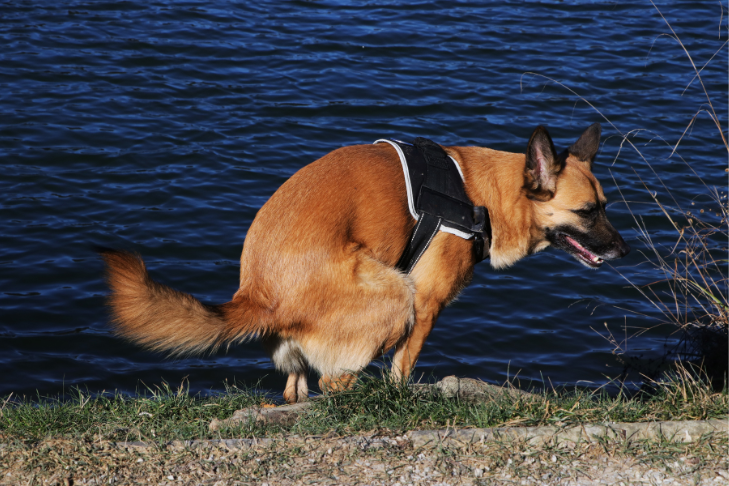What Your Dog's Poop Can Tell You About Their Health

Understanding your dog’s poop is more important than you might think. It can provide insights into their overall health and alert you to potential issues before they become serious. Bear with us as we explore all the different aspects of your dog’s waste—from color and consistency to size and smell—and what these signs can indicate about their health.
The Basics of Pet Poop
Evaluating canine waste is a straightforward way to gauge digestive health. Here’s what to look for in healthy versus unhealthy poop.
Healthy Poop: Ideal dog poop should be chocolate brown, firm, and shaped like a log. This indicates that your dog is eating a balanced diet and that their digestive system is functioning properly.
Unhealthy Poop: If your dog’s poop deviates from this norm in texture or color, it could be a sign of health problems. It’s essential to monitor any sudden or consistent changes.

Identifying Healthy vs. Unhealthy Dog Stools
Colors and consistencies in your dog’s poop can indicate various health conditions. Understanding these can help you respond appropriately.
- Brown: Typical and healthy. Shows that your dog’s digestion is on track.
- Green: Might be due to eating grass or excessive vegetables, or it could indicate gallbladder issues.
- Yellow: This unusual color could be a sign of liver or pancreas problems, or issues with bile production.
- Black or Very Dark: Often suggests bleeding in the upper gastrointestinal tract and requires urgent veterinary care.
- Red Streaks: Presence of fresh blood could be an indicator of cuts in the lower gastrointestinal tract or other serious conditions.
- White Dots: Often suggest internal parasites, like worms, and should be checked by a vet.
- Grey and Greasy: Indicates a potential issue with the pancreas or bile duct, which might affect fat digestion.

Analyzing Your Dog’s Poop Size
- Small, Hard Balls: Indicate dehydration or constipation. Consider increasing your dog’s water intake and adjusting their diet.
- Large, Loose Stools: Could be a sign of overfeeding or a digestive problem where nutrients aren’t being properly absorbed.
- Liquid: Diarrhea can be a serious concern that could stem from infections, stress, or dietary indiscretion. Persistent diarrhea calls for a vet visit.
Understanding Your Dog’s Poop Texture
The texture of your dog’s waste can vary significantly and often signals the state of their digestive health.
- Firm and Log-Shaped: This is the gold standard, indicating your dog is healthy.
- Soft and Formless: A possible sign of a mild digestive issue or an overly fibrous diet.
- Liquid: Diarrhea is a serious concern that could stem from infections, stress, or dietary indiscretion. Persistent diarrhea calls for a vet visit.

Decoding Your Dog’s Poop Smell
While never necessarily pleasant, the odor of your dog’s poop can vary and sometimes signal health issues.
- Normal Smell: Dog poop isn’t supposed to smell good, but it shouldn’t be exceptionally offensive.
- Extremely Foul Odor: This could be a sign of a serious digestive problem and warrants a veterinary consultation.
The Importance of a Healthy Gut Microbiome in Dogs
A healthy gut microbiome is vital for your dog’s overall health, affecting everything from digestion to immune response. Tummy troubles are among the most common reasons pets are seen at the vet. Regularly assessing the quality of your dog’s poop helps maintain an optimal balance of gut bacteria, essential for preventing and quickly addressing gastrointestinal disturbances.
By understanding what your dog’s poop is telling you, you can catch potential health issues early and consult with your vet for the best course of action. Regular monitoring of your dog’s potty habits and maintaining a healthy diet are key components to managing their overall well-being.
For pet parents committed to proactively enhancing their dog’s gut health, adding Postbiotics to their diet is a beneficial strategy. These supplements are designed to help manage occasional loose stools and gastric distress while also supporting the immune system. They offer all the desired health benefits without the typical side effects caused by introducing foreign bodies (probiotics), like gas and bloating, promoting not only healthier poops but also a happier, more comfortable pup.
Explore More on Dog Health and Nutrition:
The Ultimate Guide to Probiotics for Dogs: Benefits, Uses, and Tips


